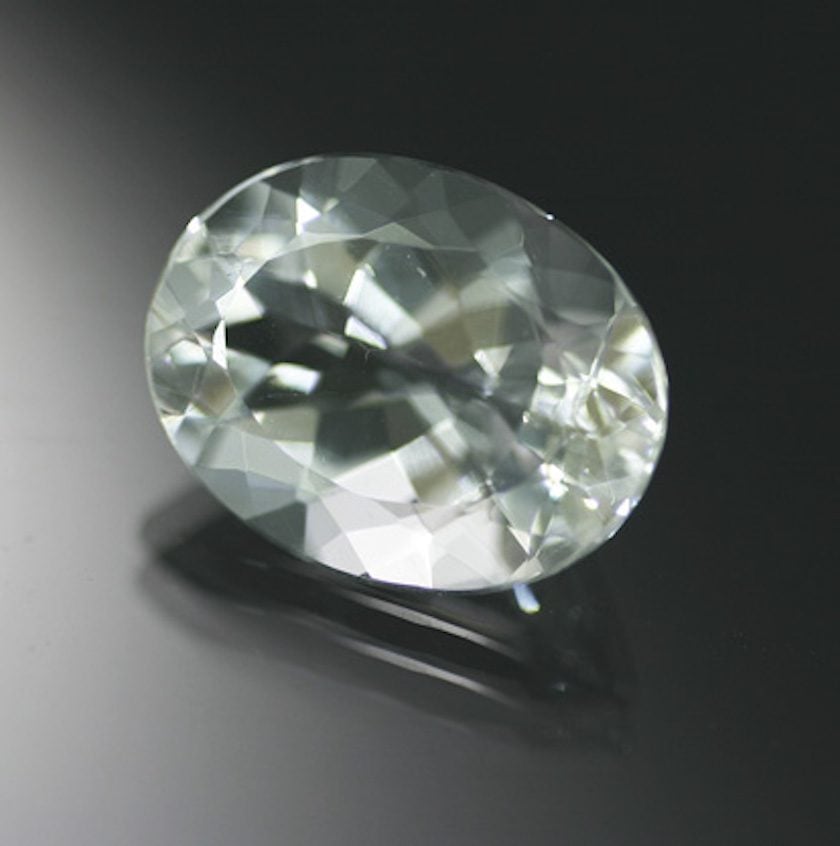Pollucite Value, Price, and Jewelry Information
Colorless pollucites lack fire when cut and are usually small. However, this very rare cesium mineral is a coveted collector's gem.
2 Minute Read
Colorless pollucites lack fire when cut and are usually small. However, this very rare cesium mineral is a coveted collector’s gem.
Start an IGS Membership today
for full access to our price guide (updated monthly).Pollucite Value
Comments
Pollucite belongs to the zeolite mineral group. It forms a solid solution series, as the cesium (Cs) analogue, with analcime, the sodium analogue.
Not only is gem-quality pollucite very rare, it's also the only mineral which has Cs as an essential constituent. This mineral serves as the principal ore for cesium.
You're more likely to find this gem in mineral collections than in jewelry collections. However, recent gem-quality finds in Afghanistan could change that.
How Did Pollucite Get Its Name?
Discovered in 1846 in Elba, Italy, this mineral was named after Pollux, the twin brother of Castor in Classical mythology. (Helen of Troy and the ill-starred Clytemnestra were his sisters). The discoverers associated it with castorite, named after Castor, since both occurred in lithium-rich granite pegmatites at this source. Although castorite was later renamed petalite, the name pollucite remained.
Oddly enough, according to myth, Pollux was immortal while Castor was mortal. So, too, did the name "castorite" pass away. Furthermore, some myths claim the twins had different fathers, immortal Zeus and the mortal Tyndareus. So, though originally paired, these minerals proved to be distinct, too.
Synthetics
Scientists have synthesized this mineral hydrothermally for use in the storage of radioactive waste. However, no commercial jewelry use for these synthetics is known.
Treatments
No known gem treatments.
Sources
Notable gem-quality sources include the following:
- United States: Gem material from various localities in Maine, including Newry and Mt. Mica, and Massachusetts; San Diego County, California; Middletown, Connecticut; Custer County, South Dakota: massive material in thick seams.
- Afghanistan; Bernie Lake, Manitoba, Canada; Finland; Elba, Italy; Kazakhstan; Pakistan; Karibib, Namibia; Varutrask, Sweden: massive lilac to white material (N = 1.518, SG 2.90).
These pollucites on matrix show blue-white fluorescence. 14.0 x 11.0 x 8.5 cm (largest pollucite crystal measures 7 cm across). Shengus area, Skardu Road, Gilgit Division, Pakistan. © Rob Lavinsky, www.iRocks.com. Used with permission.
Stone Sizes
Despite the existence of large beds at some localities, gems sizes are always very small, under 10 carats.
Opaque, whitish masses in South Dakota reach 3-4 feet in thickness but usually yield colorless, very small gems.
Maine material cuts stones from masses that reach up to 10 inches in size.
- Smithsonian Institution (Washington, DC): 8.5 (colorless, Maine); 7.0 (colorless, Connecticut).
- Private Collection: 3.85 (pinkish, Maine).
Care
Pollucites can reach the hardness of quartz (7) and require no special care or settings. Consult our gemstone jewelry care guide for more recommendations.
Note: In metal form, cesium is toxic, and the isotopes produced as nuclear waste or for medical purposes are radioactive. However, naturally occurring cesium, such as that found in pollucite gems, should pose no risks.
Joel E. Arem, Ph.D., FGA
Dr. Joel E. Arem has more than 60 years of experience in the world of gems and minerals. After obtaining his Ph.D. in Mineralogy from Harvard University, he has published numerous books that are still among the most widely used references and guidebooks on crystals, gems and minerals in the world.
Co-founder and President of numerous organizations, Dr. Arem has enjoyed a lifelong career in mineralogy and gemology. He has been a Smithsonian scientist and Curator, a consultant to many well-known companies and institutions, and a prolific author and speaker. Although his main activities have been as a gem cutter and dealer, his focus has always been education. joelarem.com
International Gem Society
Related Articles
Black Diamond Value, Price, and Jewelry Information
Chameleon Diamond Value, Price, and Jewelry Information
Gray Diamond Value, Price, and Jewelry Information
Green Diamond Value, Price, and Jewelry Information
Latest Articles
800 Years of Mogok: A Celebration in Tenuous Times
What is the Average Gemstone Faceting Yield?
Pyroxmangite Value, Price, and Jewelry Information
How to Identify Emerald Simulants and Synthetics
Never Stop Learning
When you join the IGS community, you get trusted diamond & gemstone information when you need it.
Get Gemology Insights
Get started with the International Gem Society’s free guide to gemstone identification. Join our weekly newsletter & get a free copy of the Gem ID Checklist!
